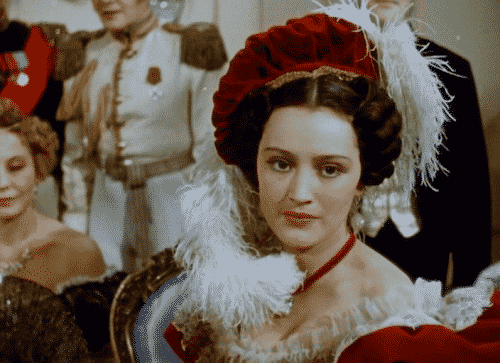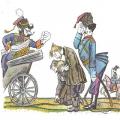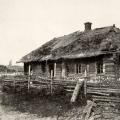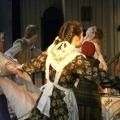The image of Tatyana Larina in the novel "Eugene Onegin" by Pushkin in quotes
Article menu:
Women, whose behavior and appearance differ from the generally accepted canons of the ideal, have always attracted the attention of both literary figures and readers. The description of this type of people allows you to lift the veil of unknown life quests and aspirations. The image of Tatyana Larina is perfect for this role.
Family and childhood memories
Tatyana Larina, by her origin, belongs to the nobility, but all her life she was deprived of a vast secular society - she always lived in the countryside and never aspired to an active city life.
Tatyana's father Dmitry Larin was a foreman. At the time of the actions described in the novel, he is no longer alive. It is known that he died young. "He was a simple and kind gentleman."
The girl's mother's name is Polina (Praskovya). She was given away as a girl under duress. For some time she was discouraged and tormented, feeling a sense of affection for another person, but over time she found happiness in family life with Dmitry Larin.
Tatyana still has a sister, Olga. She is not at all like her sister in character: gaiety and coquetry are a natural state for Olga.
An important person for the formation of Tatyana as a person was played by her nanny Filipyevna. This woman is a peasant by birth and, perhaps, this is her main charm - she knows a lot of folk jokes and stories that so lure the inquisitive Tatyana. The girl has a very reverent attitude towards the nanny, she sincerely loves her.
Naming and prototypes
Pushkin emphasizes the unusualness of his image already at the very beginning of the story, giving the girl the name Tatyana. The fact is that for the high society of that time, the name Tatyana was not characteristic. This name at that time had a pronounced common character. Pushkin's drafts contain information that the heroine's original name was Natalya, but later Pushkin changed his intention.
Alexander Sergeevich mentioned that this image is not without a prototype, but did not indicate who exactly served him such a role.
Naturally, after such statements, both his contemporaries and researchers of later years actively analyzed Pushkin's entourage and tried to find Tatyana's prototype.
Opinions on this issue are divided. It is possible that several prototypes were used for this image.
One of the most suitable candidates is Anna Petrovna Kern - her similarity in character with Tatyana Larina leaves no doubt.
The image of Maria Volkonskaya is ideal for describing the resilience of Tatyana's character in the second part of the novel.
The next person who bears a resemblance to Tatyana Larina is Pushkin's sister Olga. In her temperament and character, she ideally matches the description of Tatyana in the first part of the novel.
Tatyana also has a certain similarity with Natalya Fonvizina. The woman herself found a great resemblance to this literary character and expressed the opinion that Tatiana's prototype was her.
An unusual assumption about the prototype was made by Pushkin's lyceum friend Wilhelm Kuchelbecker. He found that the image of Tatyana is very similar to Pushkin himself. This similarity is especially evident in chapter 8 of the novel. Kuchelbecker claims: “the feeling with which Pushkin is overwhelmed is noticeable, although he, like his Tatyana, does not want the world to know about this feeling.”
Question about the age of the heroine
In the novel, we meet Tatyana Larina during her growing up. She is a marriageable girl.
The opinions of the researchers of the novel on the issue of the year of the girl's birth differed.
Yuri Lotman claims that Tatyana was born in 1803. In this case, in the summer of 1820, she just turned 17 years old.
However, this opinion is not the only one. There is an assumption that Tatyana was much younger. Such thoughts are prompted by the nanny's story that she was married off at the age of thirteen, as well as the mention that Tatyana, unlike most girls of her age, did not play with dolls at that time.
V.S. Babaevsky puts forward another version about Tatyana's age. He believes that the girl must be much older than the age assumed by Lotman. If the girl had been born in 1803, then the girl's mother's concern about the lack of options for her daughter's marriage would not have been so pronounced. In this case, a trip to the so-called “bride fair” would not yet be a necessity.
The appearance of Tatyana Larina
Pushkin does not go into a detailed description of Tatyana Larina's appearance. The author is more interested in the inner world of the heroine. We learn about Tatyana's appearance in contrast to the appearance of her sister Olga. The sister has a classic appearance - she has beautiful blond hair, a ruddy face. In contrast, Tatyana has dark hair, her face is too pale, devoid of color.
We offer you to get acquainted with A. S. Pushkin "Eugene Onegin"
Her gaze is full of despondency and sadness. Tatyana was too thin. Pushkin notes, "no one could call her beautiful." Meanwhile, she was still an attractive girl, she had a special beauty.
Leisure and attitude to needlework
It was generally accepted that the female half of society spent their free time doing needlework. Girls, in addition, still played with dolls or various active games (the most common was the burner).
Tatiana does not like to do any of these activities. She loves to listen to the nanny's scary stories and sit by the window for hours.
Tatyana is very superstitious: "The omens worried her." The girl also believes in fortune-telling and that dreams do not just happen, they carry a certain meaning.
Tatyana is fascinated by novels - "they replaced everything for her." She likes to feel like the heroine of such stories.
However, Tatyana Larina's favorite book was not a love story, but a dream book "Martyn Zadeka later became / Tanya's Favorite." Perhaps this is due to Tatyana's great interest in mysticism and everything supernatural. It was in this book that she could find the answer to her question: “consolations / In all sorrows she gives / And sleeps with her incessantly.”
Personality characteristic
Tatyana is not like most girls of her era. This applies to external data, and hobbies, and character. Tatyana was not a cheerful and active girl who was easily given to coquetry. "Dika, sad, silent" - this is Tatiana's classic behavior, especially in society.
Tatyana loves to indulge in dreams - she can fantasize for hours. The girl hardly understands her native language, but is in no hurry to learn it, in addition, she rarely educates herself. Tatyana prefers novels that can disturb her soul, but at the same time she cannot be called stupid, rather the opposite. The image of Tatyana is full of "perfections". This fact is sharply contrasted with the rest of the characters in the novel, who do not have such components.
In view of her age and inexperience, the girl is too trusting and naive. She trusts the impulse of emotions and feelings.
Tatyana Larina is capable of tender feelings not only in relation to Onegin. With her sister Olga, despite the striking difference of girls in temperament and perception of the world, she is connected by the most devoted feelings. In addition, a feeling of love and tenderness arises in her in relation to her nanny.
Tatyana and Onegin
New people coming to the village always arouse the interest of the permanent residents of the area. Everyone wants to get to know the visitor, learn about him - life in the village is not distinguished by a variety of events, and new people bring with them new topics for conversation and discussion.
Onegin's arrival did not go unnoticed. Vladimir Lensky, who was lucky enough to become Yevgeny's neighbor, introduces Onegin to the Larins. Eugene is very different from all the inhabitants of village life. His manner of speaking, behaving in society, his education and ability to carry on a conversation pleasantly amaze Tatiana, and not only her.
However, “early the feelings in him cooled down”, Onegin “has completely cooled down to life”, he is already bored with beautiful girls and their attention, but Larina does not know about it.

Onegin instantly becomes the hero of Tatiana's novel. She idealizes the young man, he seems to her to have descended from the pages of her love books:
Tatyana loves not jokingly
And surrender unconditionally
Love like a sweet child.
Tatyana suffers for a long time in languor and decides to take a desperate step - she decides to confess to Onegin and tell him about her feelings. Tatyana is writing a letter.
The letter carries a double meaning. On the one hand, the girl expresses indignation and grief associated with the arrival of Onegin and her love. She lost the peace in which she lived before, and this leads the girl to bewilderment:
Why did you visit us
In the wilderness of a forgotten village
I would never have known you.
I would not know bitter torment.
On the other hand, the girl, having analyzed her position, sums up: the arrival of Onegin is her salvation, this is fate. By her character and temperament, Tatyana could not have become the wife of any of the local suitors. She is too alien and incomprehensible for them - Onegin is another matter, he is able to understand and accept her:
That in the supreme council is destined ...
That is the will of heaven: I am yours;
My whole life has been a pledge
Faithful goodbye to you.
However, Tatyana's hopes did not come true - Onegin does not love her, but only played with the girl's feelings. The next tragedy in the girl's life is the news of the duel between Onegin and Lensky, and the death of Vladimir. Eugene leaves.
Tatyana falls into a blues - she often comes to Onegin's estate, reads his books. Over time, the girl begins to understand that the real Onegin is fundamentally different from the Eugene she wanted to see. She just idealized the young man.
This is where her unfulfilled romance with Onegin ends.
Tatyana's dream
Unpleasant events in the girl's life, connected with the lack of mutual feelings in the subject of her love, and then death, two weeks before the wedding of the groom's sister Vladimir Lensky, were preceded by a strange dream.
Tatyana always attached great importance to dreams. This same dream is doubly important for her, because it is the result of Christmas divination. Tatyana was supposed to see her future husband in a dream. The dream becomes prophetic.
At first, the girl finds herself in a snowy meadow, she approaches the stream, but the passage through it is too fragile, Larina is afraid to fall and looks around in search of an assistant. A bear appears from under a snowdrift. The girl is frightened, but when she sees that the bear is not going to attack, but, on the contrary, offers her his help, holds out her hand to him - the obstacle has been overcome. However, the bear is in no hurry to leave the girl, he follows her, which frightens Tatyana even more.
The girl tries to escape from the pursuer - she goes to the forest. The branches of the trees cling to her clothes, take off her earrings, tear off her scarf, but Tatyana, seized with fear, runs forward. Deep snow prevents her from escaping and the girl falls. At this time, a bear overtakes her, he does not attack her, but picks her up and carries her further.
A hut appears ahead. The bear says that his godfather lives here and Tatiana can warm up. Once in the hallway, Larina hears the noise of fun, but it reminds her of a wake. Strange guests are sitting at the table - monsters. The girl is disassembled both by fear and curiosity, she quietly opens the door - Onegin turns out to be the owner of the hut. He notices Tatyana and goes to her. Larina wants to run away, but she can't - the door opens and all the guests see her:
… Violent laughter
Resounded wildly; everyone's eyes,
Hooves, trunks are crooked,
Crested tails, fangs,
Mustaches, bloody tongues,
Horns and fingers of bone,
Everything points to her.
And everyone screams: mine! my!
The imperious host calms the guests - the guests disappear, and Tatyana is invited to the table. Immediately, Olga and Lensky appear in the hut, causing a storm of indignation from Onegin. Tatyana is horrified by what is happening, but does not dare to intervene. In a fit of anger, Onegin takes a knife and kills Vladimir. The dream ends, it's already morning in the yard.
Tatyana's marriage
A year later, Tatyana's mother comes to the conclusion that it is necessary to take her daughter to Moscow - Tatyana has every chance to remain virgins:
At Kharitonya in the alley
Carriage in front of the house at the gate
Has stopped. To an old aunt
The fourth year of the patient in consumption,
They have arrived now.
Aunt Alina joyfully received the guests. She herself could not get married at one time and lived alone all her life.
Here, in Moscow, Tatyana is noticed by an important, fat general. He was struck by the beauty of Larina and "meanwhile, he does not take his eyes off her."
The age of the general, as well as his exact name, Pushkin does not give in the novel. Admirer Larina Alexander Sergeevich calls General N. It is known that he took part in military events, which means that his career advancement could take place at an accelerated pace, in other words, he received the rank of general without being in old age.
Tatyana, on the other hand, does not feel a shadow of love towards this person, but nevertheless agrees to marriage.
The details of their relationship with her husband are not known - Tatyana resigned herself to her role, but she did not have a feeling of love for her husband - he was replaced by affection and a sense of duty.
Love for Onegin, despite the debunking of his idealistic image, still has not left Tatyana's heart.
Meeting with Onegin
Two years later, Eugene Onegin returns from his journey. He does not go to his village, but visits his relative in St. Petersburg. As it turned out, during these two years, changes took place in the life of his relative:
"So you're married! I didn't know before!
How long ago? - About two years. -
"On whom?" - On Larina. - "Tatyana!"
Always able to restrain himself, Onegin succumbs to excitement and feelings - he is seized by anxiety: “Is she really? But definitely… No…”
Tatyana Larina has changed a lot since their last meeting - they no longer look at her as a strange provincial:
The ladies moved closer to her;
The old women smiled at her;
The men bowed down
The girls were quieter.
Tatyana learned to behave like all secular women. She knows how to hide her emotions, is tactful towards other people, there is a certain amount of coolness in her behavior - all this causes Onegin to be surprised.
Tatyana, it seems, was not at all dumbfounded, unlike Evgeny, by their meeting:
Her eyebrow did not move;
She didn't even purse her lips.
Always so bold and lively, Onegin was at a loss for the first time and did not know how to speak to her. Tatyana, on the contrary, asked him with the most indifferent expression on her face about the trip and the date of his return.
Since then, Eugene loses peace. He realizes that he loves the girl. He comes to them every day, but feels embarrassed in front of the girl. All his thoughts are occupied only by her - in the morning he jumps out of bed and counts the hours left until their meeting.
But the meetings do not bring relief - Tatyana does not notice his feelings, she behaves with restraint, proudly, in a word, just like Onegin himself towards her two years ago. Consumed by excitement, Onegin decides to write a letter.
I notice a spark of tenderness in you,
I did not dare to believe her - he writes about the events of two years ago.
Eugene confesses his love to a woman. “I was punished,” he says, explaining his recklessness in the past.
Like Tatyana, Onegin entrusts her with the solution of the problem that has arisen:
Everything is decided: I'm in your will
And surrender to my destiny.
However, there was no answer. The first letter is followed by another and another, but they remain unanswered. Days pass - Eugene cannot lose his anxiety and confusion. He again comes to Tatyana and finds her sobbing over his letter. She was very similar to the girl he met two years ago. Excited Onegin falls at her feet, but
Tatyana is categorical - her love for Onegin has not yet faded away, but Eugene himself ruined their happiness - he neglected her when she was unknown to anyone in society, not rich and not "favored by the court." Eugene was rude to her, he played with her feelings. Now she is the wife of another man. Tatyana does not love her husband, but she will be “faithful to him for a century”, because it cannot be otherwise. Another version of the development of events is contrary to the life principles of the girl.
Tatyana Larina in the assessment of critics
Roman A.S. Pushkin "Eugene Onegin" became the subject of active research and scientific-critical activity for several generations. The image of the main character Tatyana Larina became the cause of repeated disputes and analyzes.
- Y. Lotman in his works he actively analyzed the essence and principle of writing Tatyana's letter to Onegin. He came to the conclusion that the girl, having read novels, recreated "a chain of reminiscences primarily from the texts of French literature."
- V.G. Belinsky, says that for Pushkin's contemporaries, the release of the third chapter of the novel was a sensation. The reason for this was a letter from Tatyana. According to the critic, Pushkin himself until that moment did not realize the power produced by the letter - he calmly read it, just like any other text.
The writing style is a little childish, romantic - this is touching, because Tatyana had not known the feelings of love even before that “the language of passions was so new and not accessible to the morally dumb Tatyana: she would not have been able to understand or express her own feelings if she had not resorted to to help the impressions left on her.” - D. Pisarev did not turn out to be such an inspired image of Tatyana. He believes that the girl's feelings are fake - she inspires them herself and thinks that this is the truth. While analyzing the letter to Tatyana, the critic notes that Tatyana is still aware of Onegin’s lack of interest in her person, for she puts forward the assumption that Onegin’s visits will not be regular, this state of affairs does not allow the girl to become a “virtuous mother”. “And now I, by your grace, a cruel man, must disappear,” writes Pisarev. In general, the image of a girl in his concept is not the most positive and borders on the definition of a “village”.
- F. Dostoevsky believes that Pushkin should have named his novel not by the name of Yevgeny, but by the name of Tatyana. Since it is this heroine who is the main character in the novel. In addition, the writer notes that Tatyana has a much greater mind than Eugene. She knows how to do the right thing in the right situations. Her image is noticeably different hardness. “The type is firm, standing firmly on its own soil,” Dostoevsky says about her.
- V. Nabokov notes that Tatyana Larina has become one of her favorite characters. As a result, her image has become "a 'national type' of a Russian woman." However, over time, this character was forgotten - with the beginning of the October Revolution, Tatyana Larina lost her significance. For Tatyana, according to the writer, there was another unfavorable period. During Soviet rule, the younger sister Olga occupied a much more advantageous position in relation to her sister.
The image of Tatyana Larina in the novel "Eugene Onegin" by Pushkin in quotes
5 (100%) 3 votes “Lefty” - a summary of the work N
“Lefty” - a summary of the work N Turgenev, "Biryuk": a summary
Turgenev, "Biryuk": a summary Comedy A.N. Ostrovsky "Poverty is not a vice": a summary of the work
Comedy A.N. Ostrovsky "Poverty is not a vice": a summary of the work